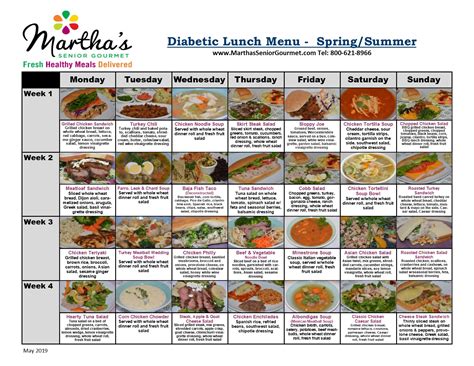Intro
Discover a personalized diabetic diet plan, managing blood sugar with healthy meal ideas, nutrition tips, and glucose control strategies for a balanced lifestyle.
Living with diabetes requires a significant amount of planning and management, particularly when it comes to diet. A well-planned diabetic diet plan can help individuals manage their blood sugar levels, maintain a healthy weight, and reduce the risk of complications associated with diabetes. In this article, we will delve into the importance of a diabetic diet plan, its benefits, and provide guidance on how to create a personalized plan.
A diabetic diet plan is not just about cutting out sugary foods and drinks, but rather about adopting a balanced and nutritious eating pattern that takes into account the individual's lifestyle, preferences, and health goals. With the right diet plan, individuals with diabetes can improve their overall health, increase their energy levels, and enhance their quality of life. Whether you are newly diagnosed or have been living with diabetes for years, a well-planned diet plan can make a significant difference in managing your condition.
The importance of a diabetic diet plan cannot be overstated. Diabetes is a chronic condition that affects the way the body processes glucose, a type of sugar that is found in many foods. When an individual has diabetes, their body either cannot produce enough insulin, a hormone that regulates blood sugar levels, or cannot effectively use the insulin it produces. As a result, blood sugar levels can become too high, leading to a range of complications, including heart disease, kidney damage, and nerve damage. A diabetic diet plan can help individuals manage their blood sugar levels, reducing the risk of these complications and improving their overall health.
Understanding the Basics of a Diabetic Diet Plan

A diabetic diet plan is based on several key principles, including eating a variety of nutritious foods, monitoring carbohydrate intake, and staying hydrated. The plan should be tailored to the individual's lifestyle, preferences, and health goals, taking into account factors such as age, sex, weight, and physical activity level. The goal of a diabetic diet plan is to provide the body with the nutrients it needs to function properly, while also managing blood sugar levels and reducing the risk of complications.
Key Components of a Diabetic Diet Plan
A diabetic diet plan typically includes several key components, including: * Eating a variety of whole, unprocessed foods, such as vegetables, fruits, whole grains, lean proteins, and healthy fats * Monitoring carbohydrate intake, as carbohydrates have a significant impact on blood sugar levels * Staying hydrated by drinking plenty of water and limiting sugary drinks * Limiting intake of added sugars, saturated fats, and refined carbohydrates * Eating regular, balanced meals to help regulate blood sugar levelsBenefits of a Diabetic Diet Plan

A well-planned diabetic diet plan can have numerous benefits, including:
- Improved blood sugar control: A diabetic diet plan can help individuals manage their blood sugar levels, reducing the risk of complications associated with diabetes.
- Weight management: A diabetic diet plan can help individuals achieve and maintain a healthy weight, which can improve insulin sensitivity and reduce the risk of complications.
- Improved overall health: A diabetic diet plan can help individuals adopt healthy eating habits, reducing the risk of heart disease, kidney damage, and other complications associated with diabetes.
- Increased energy levels: A diabetic diet plan can help individuals manage their energy levels, reducing fatigue and improving overall quality of life.
Creating a Personalized Diabetic Diet Plan
Creating a personalized diabetic diet plan requires careful consideration of several factors, including lifestyle, preferences, and health goals. The following steps can help individuals create a personalized plan: 1. Consult with a healthcare provider or registered dietitian to discuss dietary needs and goals. 2. Keep a food diary to track eating habits and identify areas for improvement. 3. Set realistic goals, such as eating more fruits and vegetables or reducing intake of added sugars. 4. Develop a meal plan that takes into account carbohydrate intake, protein needs, and healthy fat requirements. 5. Stay hydrated by drinking plenty of water and limiting sugary drinks.Managing Carbohydrates in a Diabetic Diet Plan

Carbohydrates have a significant impact on blood sugar levels, making them a critical component of a diabetic diet plan. The following tips can help individuals manage carbohydrates:
- Choose complex carbohydrates, such as whole grains, fruits, and vegetables, which are rich in fiber and nutrients.
- Monitor carbohydrate intake, using tools such as a food diary or carbohydrate counting system.
- Limit intake of refined carbohydrates, such as white bread and sugary snacks, which can cause a rapid spike in blood sugar levels.
- Eat regular, balanced meals to help regulate blood sugar levels.
Healthy Food Choices for a Diabetic Diet Plan
Healthy food choices are essential for a diabetic diet plan, providing the body with the nutrients it needs to function properly. The following foods are rich in nutrients and can help individuals manage their blood sugar levels: * Leafy green vegetables, such as spinach and kale * Berries, such as blueberries and strawberries * Fatty fish, such as salmon and tuna * Whole grains, such as brown rice and quinoa * Lean proteins, such as chicken and turkeyCommon Mistakes to Avoid in a Diabetic Diet Plan

A diabetic diet plan requires careful planning and attention to detail, and there are several common mistakes to avoid:
- Not monitoring carbohydrate intake, which can lead to high blood sugar levels.
- Not staying hydrated, which can lead to dehydration and electrolyte imbalances.
- Eating too much added sugar, which can cause a rapid spike in blood sugar levels.
- Not eating regular, balanced meals, which can lead to fluctuations in blood sugar levels.
Overcoming Challenges in a Diabetic Diet Plan
A diabetic diet plan can be challenging to follow, particularly in social situations or when eating out. The following tips can help individuals overcome common challenges: * Plan ahead, packing healthy snacks and meals when eating out or traveling. * Choose restaurants that offer healthy options, such as salads and grilled meats. * Don't be afraid to ask for modifications, such as requesting no added sugar or salt. * Stay hydrated by drinking plenty of water throughout the day.Conclusion and Next Steps

A well-planned diabetic diet plan can make a significant difference in managing diabetes and improving overall health. By understanding the basics of a diabetic diet plan, creating a personalized plan, and avoiding common mistakes, individuals can take control of their health and reduce the risk of complications associated with diabetes. If you are living with diabetes, we encourage you to take the first step towards creating a personalized diet plan, consulting with a healthcare provider or registered dietitian to discuss your dietary needs and goals.
What is a diabetic diet plan?
+A diabetic diet plan is a personalized eating plan that helps individuals with diabetes manage their blood sugar levels, maintain a healthy weight, and reduce the risk of complications associated with diabetes.
How do I create a personalized diabetic diet plan?
+To create a personalized diabetic diet plan, consult with a healthcare provider or registered dietitian to discuss your dietary needs and goals. Keep a food diary to track your eating habits and identify areas for improvement. Set realistic goals and develop a meal plan that takes into account carbohydrate intake, protein needs, and healthy fat requirements.
What are the benefits of a diabetic diet plan?
+A well-planned diabetic diet plan can have numerous benefits, including improved blood sugar control, weight management, and improved overall health. It can also increase energy levels and reduce the risk of complications associated with diabetes.
We hope this article has provided you with valuable information and insights into creating a personalized diabetic diet plan. If you have any further questions or would like to share your experiences with diabetes management, please leave a comment below. Don't forget to share this article with friends and family who may be living with diabetes, and help them take the first step towards creating a personalized diet plan.
